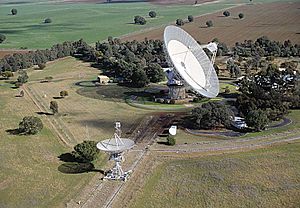Fermi paradox facts for kids
The Fermi paradox is a big question that makes us wonder: If the universe is so huge and old, with billions of stars and planets, why haven't we found any signs of other alien civilizations? It's like asking, "Where is everybody?"
The famous physicist Enrico Fermi first asked this question in 1950 during a casual chat. Later, in 1975, a paper by Michael H. Hart made more scientists think about it seriously. This is why some people also call it the Fermi–Hart paradox. Other names for this mystery include Fermi's question, the Fermi Problem, and The Great Silence.
Contents
What is the Fermi Paradox?
The Fermi paradox highlights a puzzle. On one hand, scientists believe there could be many planets out there that are just right for life to start. Some of these planets might even be billions of years older than Earth, giving life plenty of time to evolve and create advanced civilizations.
On the other hand, we haven't seen any proof of these alien civilizations. We haven't picked up any radio signals, found any alien spacecraft, or even seen any signs of their huge projects in space. This silence is what makes the paradox so interesting and a bit puzzling.
Why is it a paradox?
It's a paradox because two ideas that seem true don't fit together:
- There's a very high chance that alien life and civilizations exist.
- We haven't found any evidence of them.
These two ideas clash, creating the "paradox."
Who was Enrico Fermi?

Enrico Fermi (1901–1954) was an Italian-American physicist who was very important in the development of the first nuclear reactor. He won the Nobel Prize in Physics in 1938. He was known for asking simple but very deep questions, and the "Where are they?" question is one of his most famous. He asked it during a lunch conversation with other scientists at Los Alamos National Laboratory in 1950.
Why haven't we found them?
Scientists have come up with many ideas to try and solve the Fermi paradox. Here are a few:
Maybe they are too far away
The universe is incredibly vast. Even if there are many civilizations, they might be so far away that their signals haven't reached us yet, or they are too faint for us to detect. Traveling between stars takes a very, very long time, even at super-fast speeds.
Maybe they are hiding
Some theories suggest that advanced alien civilizations might choose to hide themselves from us. This could be for many reasons, like not wanting to interfere with less developed planets (like Earth) or simply not wanting to be found.
Maybe we are looking in the wrong way

Most of our search efforts, like the Search for Extraterrestrial Intelligence (SETI), focus on listening for radio signals. But what if aliens use a different way to communicate? Maybe they use signals we don't know how to detect, or they communicate in ways we can't even imagine.
Maybe advanced civilizations don't last long
Another idea is that advanced civilizations might not last very long. They might destroy themselves through wars, environmental problems, or other disasters before they have a chance to explore the galaxy or send out signals for a long time. This is sometimes called the "Great Filter" idea.
Maybe we are alone
While it's a less popular idea among many scientists, it's possible that Earth is unique. Maybe the conditions needed for life to start and evolve into intelligent beings are much rarer than we think.
The Drake Equation
Carl Sagan and Frank Drake, another astronomer, worked on something called the Drake equation. This equation tries to estimate how many active, communicating alien civilizations might exist in our galaxy. It uses several factors, like the number of stars, the number of planets that could support life, and the chance of life evolving. While it doesn't give a definite answer, it helps scientists think about the possibilities.
Related pages
Images for kids
-
Los Alamos National Laboratory Los Alamos, New Mexico, United States
-
A composite picture of Earth at night, showing lights from human civilization.
-
Le Moustier Neanderthals (Charles R. Knight, 1920)
-
NASA's idea of the Terrestrial Planet Finder
See also
 In Spanish: Paradoja de Fermi para niños
In Spanish: Paradoja de Fermi para niños
 | Delilah Pierce |
 | Gordon Parks |
 | Augusta Savage |
 | Charles Ethan Porter |






